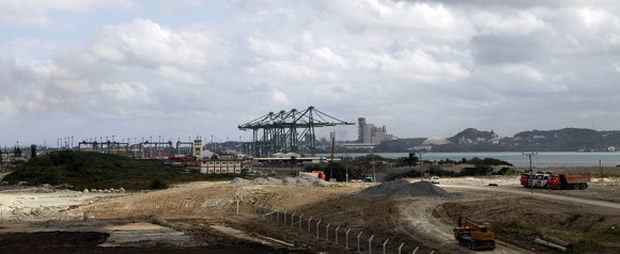
May Cuban-Americans invest in the Mariel Development Zone?
HAVANA — The question was not idle and was posed at the right place and to the people qualified to answer it, in a room next to the press center of the Second CELAC Summit and a few hours after Raúl Castro and Dilma Rousseff inaugurated on Monday (Jan. 27) the Container Terminal at Mariel, the first phase of the megaproject.
The officials? Ana Teresa Igarza, director general of the office of the Special Zone of Development at Mariel, and the first deputy minister of Foreign Trade, Antonio Carricarte. We were told that at 3:30 p.m. they would make a presentation and would answer a few questions because they had other pressing engagements.
After each presentation came three questions, all of them interesting. The moderator said that there was time for three more and I asked to be included. I had a special interest that hadn’t yet been broached.
MODERATOR: “Two colleagues have asked to speak: Ramy, from Radio Progreso Alternativa, and Laura Becquer, from the daily Granma. Go ahead.”
MANUEL ALBERTO RAMY: “Good afternoon. Please, without breaking confidentiality, we understand that several Cuban-Americans are interested in investing in the Development Zone. At least, they show an interest. The question is, first, if you can confirm that such concern, such desire, exists. Second, if the law — or the new law, or the reform of the previous Foreign Investment Law — contemplates, or considers contemplating, the possibility that Cuban-Americans invest in this country. Thank you.”
ANA TERESA IGARZA (Director General of the Office of the Special Development Zone at Mariel): “Well, to answer your question and without saying who has approached us, until this moment, even though we’re residents, we know of the interest of Cubans abroad to invest in the Zone. Not just Cuban-Americans but also Cubans living abroad. So far, only one has appeared at our office, that I can tell you, and he came to get information so he could marshal his thoughts and decide if he will invest in the Zone or not.
“That’s all we have so far. And we’re not reluctant to help them, guide them and work jointly with them. In any case, I’ll let the Deputy Minister elaborate on the subject.”
ANTONIO LUIS CARRICARTE (First Deputy Minister of Foreign Trade and Foreign Investment): “Well, the current law, Law 77, does not establish differences in the origin of the capital, so long as it meets the basic requirements of that law. What’s essential is that the projects of investment and business that are submitted be in agreement, as I mentioned, with the nation’s strategy for development.
“Any projects and proposals submitted by any person — natural persons, legal persons — will be duly analyzed. And, as I said, in the case of domestic [investment], they should abide by the forms of management that are in effect in the Cuban economy.”
It is true that Law 77, which has governed the policy of investments until now, does not exclude Cuban-Americans and émigrés in general as investors in the country. It was enacted in 1995; however, I don’t know of any investment made by émigrés, regardless of where they live. And we journalists are trackers when the topic interests us.
Intrigued and spurred by the serious rumor that began to spread a couple of years ago about a new law, I spoke with a jurist who is an expert in these matters. I asked her if Law 77 contained any element that might inhibit that possibility.
“The law is a good law,” she said categorically, and added that maybe “it would need to be retouched, updated” with the changes that are now taking place.
What obstacles would there be? And not only for possible émigré investors. Negotiations, paperwork, red tape, delays? “It is rare for an investor to wait months and months to reach an agreement,” she told me.
Another reason, partially valid for the émigrés who live in the United States, is the existence of the Helms-Burton Law, which can not only fine them but also send them to prison. So how about those who live outside the U.S., for example, in Europe?
Bank persecution is a fact, and the products involved must not contain a U.S. component greater than 10 percent. Foreigners and émigrés are aware of this. Many foreigners maintain their operations on the island, even though there was a period when their dividends were paid late (a situation that has since been overcome.)
I could add some other mental exercises. The readers may have their own. In my opinion, while it is important that the law protect these investments, they will respond favorably as a consequence of the climate that the government has created through the process of reforms or “updates.”
A favorable element in the willingness to invest (which many Cuban-Americans harbor) has already been introduced by the migration law, which is still undergoing modification — it will be broadened in recognition of the émigrés. Looser requirements, facilities, shorter distances, and broader vistas form — in my opinion — the favorable package that could provide various benefits to investors and Cuban nationals.
Indubitably, the attraction of the Development Zone has “pull” (one émigré already has made inquiries and Mrs. Igarza acknowledges that the interest is there) and good prospects, to the extent that the integral vision of the changes becomes reality.
Investors will need strong legs for the inevitable negotiations, an agility that could be described as a “value added.”
(Photo: Ismael Francisco)

